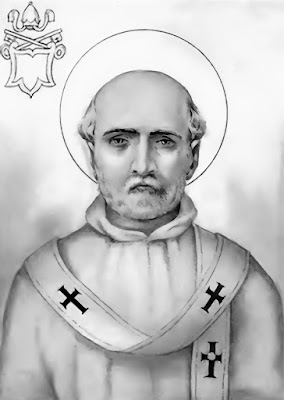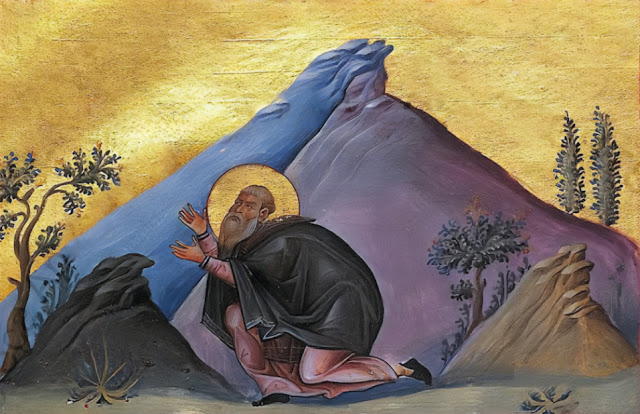Let us prepare our souls for the graces Heaven is about to shower upon the Earth in return for its homage. Tomorrow the Church will be so overflowing with joy that she will seem to be already in possession of eternal happiness. But today she appears in the garb of penance, confessing that she is still an exile. Let us fast and pray with her, for are not we too pilgrims and strangers in this world where all things are fleeting and hurry on to death? Year by year, as the great solemnity comes round, it has gathered from among our former companions new saints who bless our tears and smile upon our songs of hope. Year by year the appointed time draws nearer when we ourselves, seated at the heavenly banquet, will receive the homage of those who succeed us, and hold out a helping hand to draw them after us to the home of everlasting happiness. Let us learn, from this very hour, to emancipate our souls. Let us keep our hearts free in the midst of the vain solicitudes and false pleasures of a strange land: the exile has no care but his banishment, no joy but that which gives him a foretaste of his fatherland.
With these thoughts in mind, let us say with the Church the Collect of the Vigil:
O LORD our God, multiply your grace on us, and grant us in our holy profession to follow the joy of those whose glorious solemnity we anticipate. Through our Lord...
Let us close this month, as we opened it, by homage to Mary, Queen of the Holy Rosary, and Queen of all the Saints. The ancient Dominican Missals furnish us with a formula.
In the virginal garden, the young shoots of spring push forth, and burst into blossom with fruitful abundance. The frost and the winter have passed away, the snow and the rain are over, and roses spring up on earth from a heavenly seed.
The rose has produced a lily. During the whole time of her exile she gathered the produce of her Son’s garden: Joy for the just, and justification for sinners, glory for the elect, salvation for all.
The gifts Christ brought from Heaven, and the sufferings He endured on Earth, He bestowed upon the world when He overcame the world. He sheltered under the rose tree’s foliage, He was wounded by the thorns, He was crowned with its flowers. Thus does he call us, purify us, reward us.
Because of the leaves and thorns and flowers of the rose, we will enjoy the delights of that rich land where she, the fair cultivator, resides, the empress who joyfully presides over our militant companies, and over the nine choirs of the triple hierarchy.
Hail you, who by a new triumph repairs the loss we sustained when the enemy triumphed in the first combat. See how again he threatens fierce revenge. Unless you oppose him, every Christian must perish.
Hail, home of the Word, sanctuary of the Holy Ghost, daughter of the most high Father! In the various perils of this life, bring us unfailing assistance against the darts of the enemy. May lilies intertwined with roses from the garden of Heaven be our crown of victory after the combat. Amen.On this day according to the ROMAN MARTYROLOGY:
At Rome, the birthday of blessed Nemesius, deacon, and his daughter, the virgin Lucilla. As they could not be prevailed upon to abandon the faith of Christ, they were beheaded on the twenty-fifth of August by order of the emperor Valerian. Their bodies were buried by the blessed Pope Stephen, and afterwards more decently entombed on this day, on the Via Appia, by blessed Pope Sixtus. Pope Gregory V translated them into the sacristy of Santa Maria Nova, together with the Saints Symphronius, Olympius, tribune, Exuperia, his wife, and Theodulus, his son, who, being all converted by the exertions of Symphronius, and baptised by the same St. Stephen, had been crowned with martyrdom. These holy bodies were found there during the pontificate of Pope Gregory XIII, and placed more honourably beneath the altar of the same church on the eighth of December.
The same day, the Saints Ampliatus, Urbanus and Narcissus, who are mentioned by the blessed Apostle St. Paul in his Epistle to the Romans. They were put to death by the Jews and Gentiles for the Gospel of Christ.
At Saint-Quentin in France, St. Quinctinus, Roman citizen and senator, who endured martyrdom under the emperor Maximian. By the revelation of an angel, his body was found uncorrupt after the lapse of fifty-five years.
At Constantinople, St. Stachis, bishop, who was consecrated first bishop of that city by the blessed Apostle St. Andrew.
At Milan, St. Antoninus, bishop and confessor.
At Ratisbon, St. Wolfgang, bishop.
And in other places, many other holy martyrs, confessors and virgins.
Thanks be to God.












